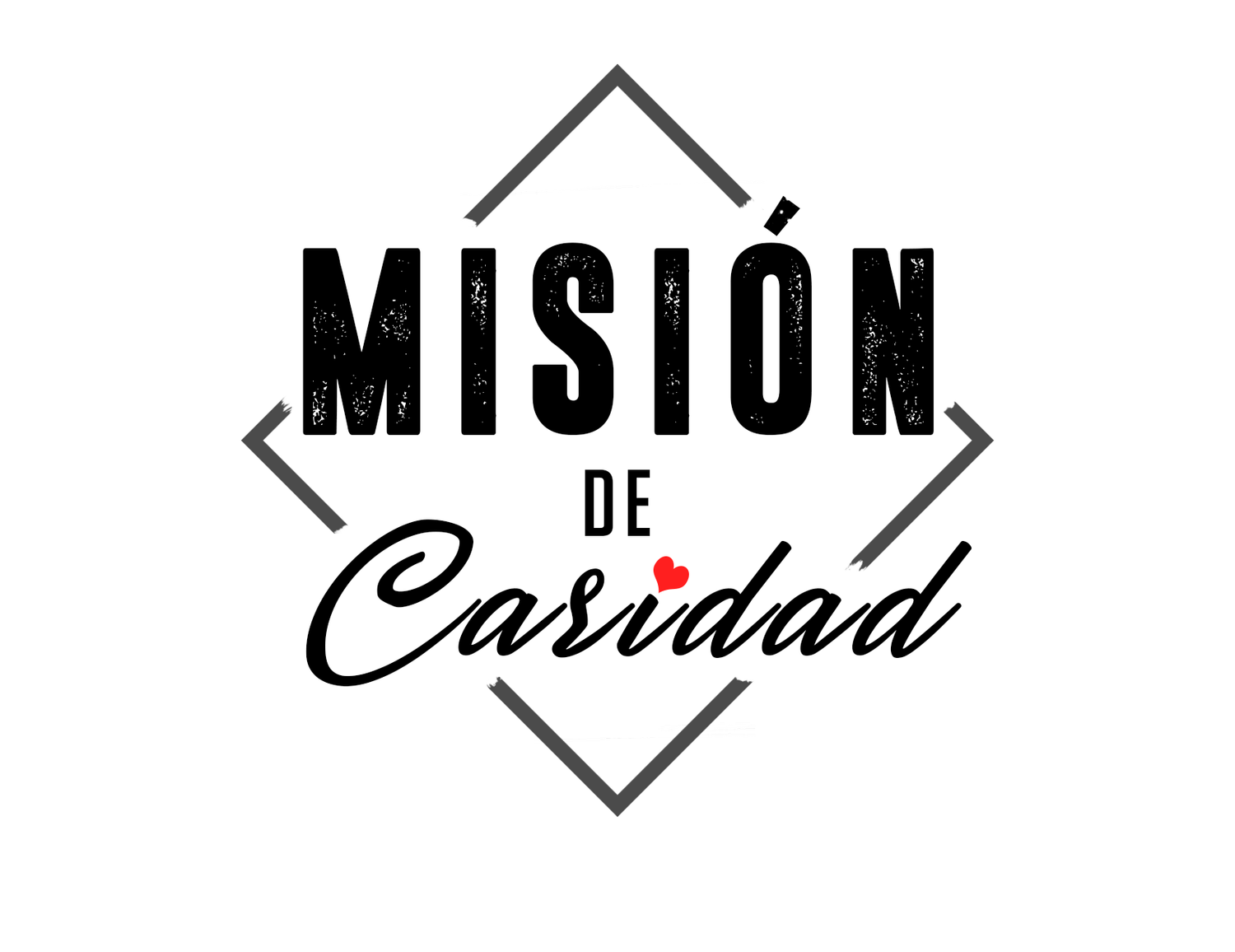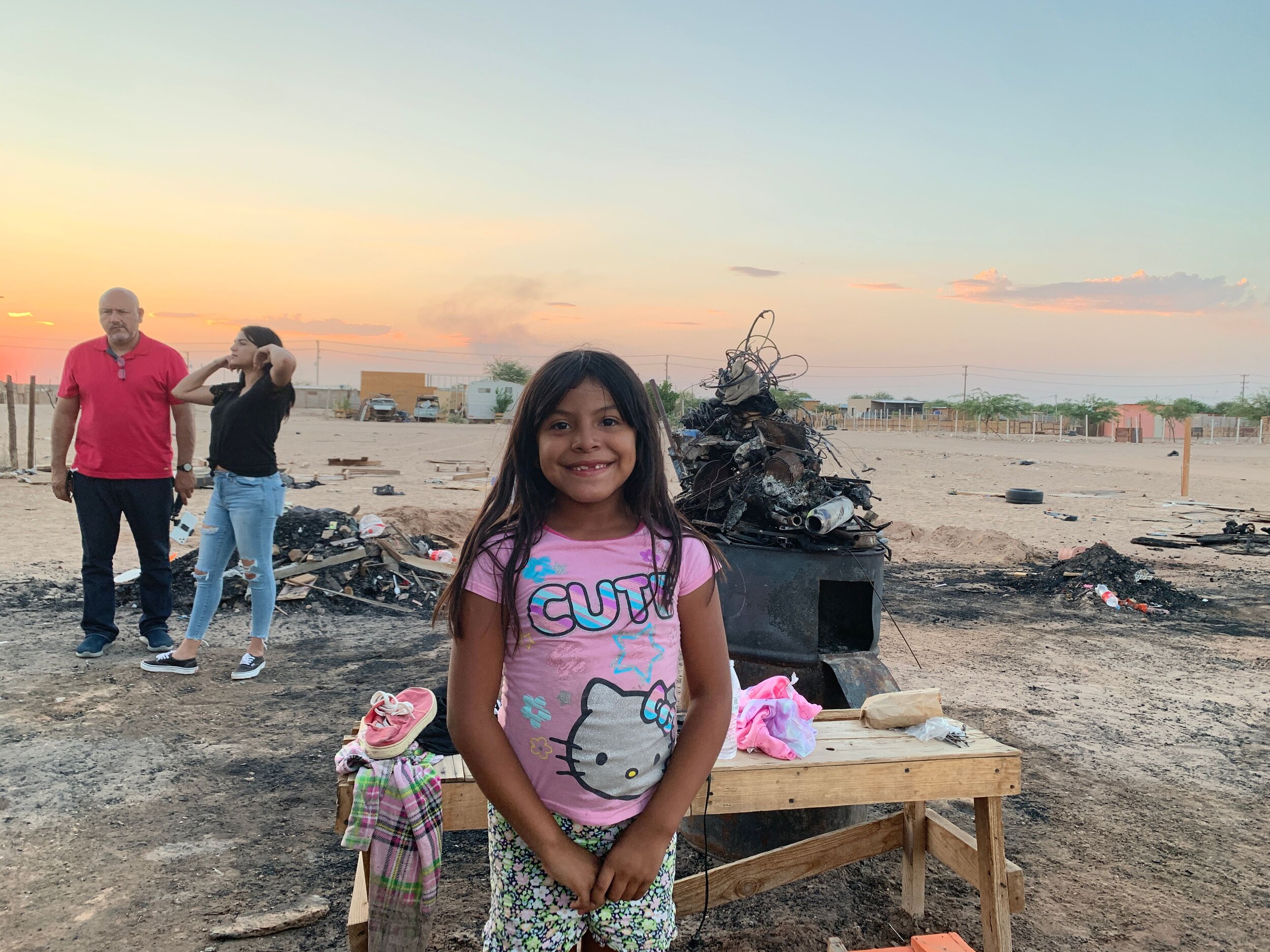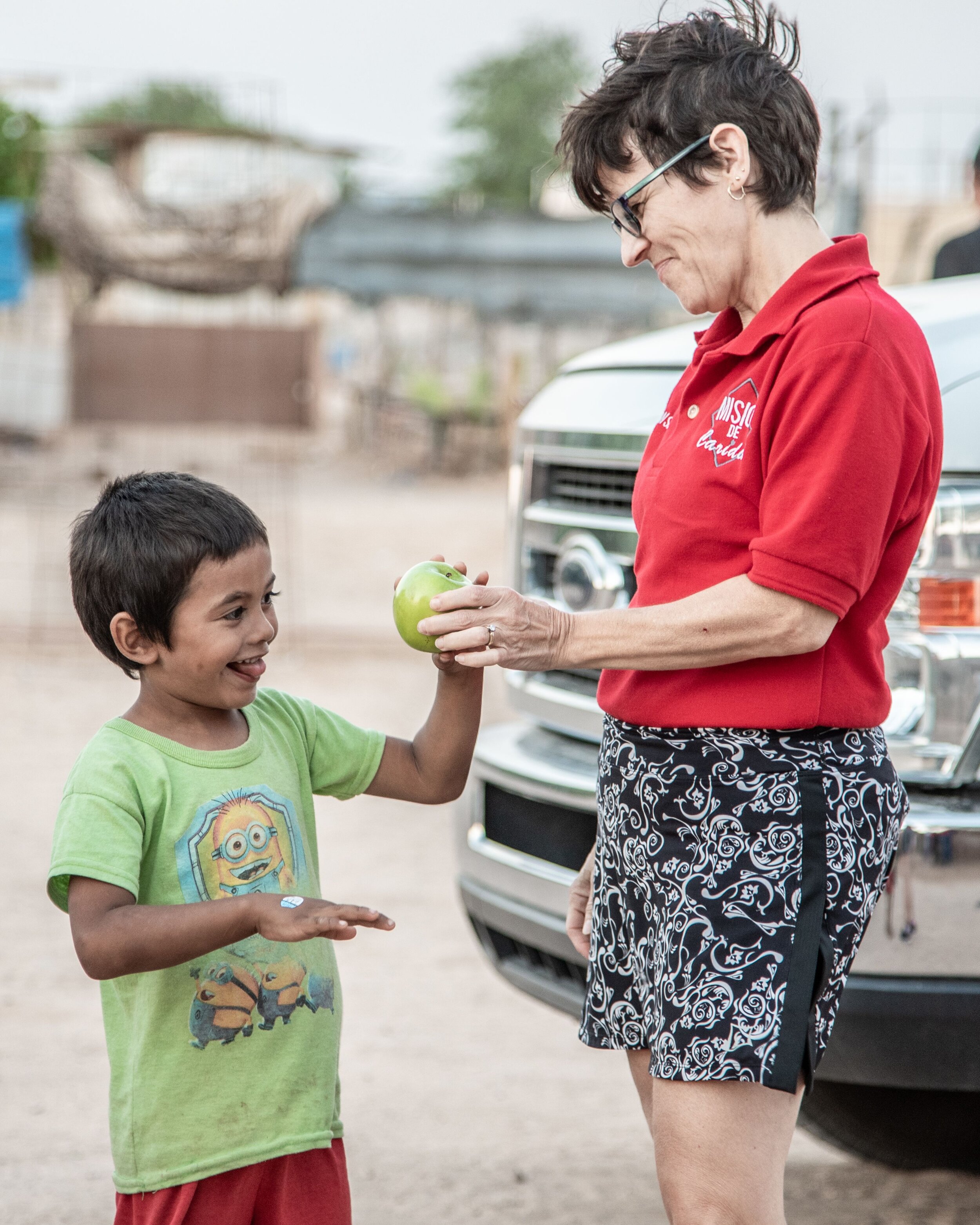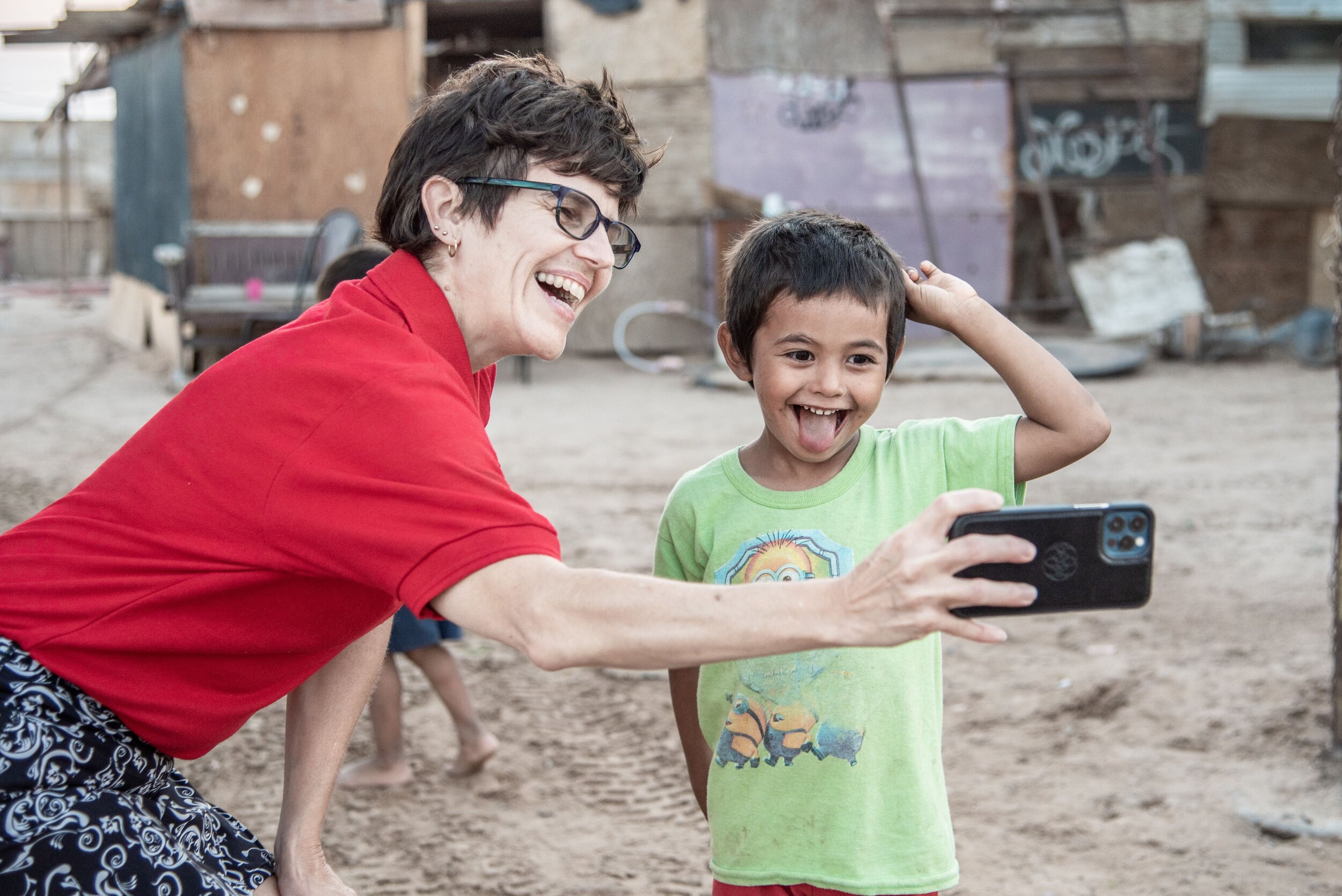If You're A Parent, You Should Read This: What The Education Gap Means For Children At The Border
During her most recent trip to Mexico, Jean and the team visited with Judith and her children, who live in one of the communities where MdC serves in Mexico. Judith’s house was destroyed in a fire recently, along with everything she owned. This recent visit was equally exciting, as they discussed the small house that MdC was going to help build for them, and disturbing. During that visit, the team saw first-hand how living in extreme poverty, with no electricity or a computer, directly impacts access to education and potential future outcomes for the children.
This is the temporary home Judith constructed after her previous home was destroyed in a fire. She is still without a bathroom and the only way to bathe or use the toilet is in a bucket.
Jean Shares Her Observations
While Francisco was discussing the building plans with Judith, I was talking with her girls about their schooling. Danya is in the 7th grade (14-years-old), and Milka is in the 2nd grade (7-years-old). The conversation was sad, and affirmed MdC’s plans to make an education attainable for every child in this community.
Milka, stands in front of the ruins of their former home. They are separating the metal to sell and burying much of the other trash in the ground (it’s too expensive to remove).
Milka’s story
Milka is Judith’s youngest daughter, at 7-years-old, and is an expressive and friendly girl with a beautiful smile. However, there are two very disturbing things that I observed. Milka has several very large cavities that have completely rotted out two of her back teeth and she is significantly behind in her schooling with no way to catch up.
Jean is helping Milka with her homework and realizing that missing the 1st grade is making it impossible for Milka to complete her current assignments.
As Milka and I sat together, Milka was writing her name on my tablet. As I watched, I could see that even writing her name was a struggle. She did not know how to properly hold a pen and struggled forming the letters. The first time she wrote her name, she left out the “L”. As I helped with her math homework, it became clear that Milka was not able to count to 10, and lacked the ability to read. There was absolutely no way she could complete the assignments that were now being asked of her in the 2nd grade.
While interacting with Milka, Jean noticed that she struggled to even write her name.
Milka is not the first child that I have seen struggling. Just the month before, I spoke with two different girls, both 8-years-old, that were still unable to read. Many studies indicate that one of the predictors of life success is how well a student reads in primary school. So, it is critically important that we work with these children as soon as possible to give them the best chance of escaping poverty in the future.
This is Milka with her brother Santiago. Like Milka and her sister, he is also not able to attend school full time. Santiago loves to draw and used Jean’s tablet to draw pictures.
Danya’s story
Life is not easy at 14, and is especially difficult when you live in extreme poverty. The most simple tasks like cooking, laundry, and even showering, are a challenge.
Danya is Judith’s oldest daughter. She is 14-years-old and is currently in the 7th grade. Danya’s school is in person 1-day per week (Wednesday) and the remaining days are 100% online. Danya’s school is far away and most days her only option is to walk the 1.5 hours to and from school. This is not terribly safe for her, but is the only option.
Danya has no way to participate during online days because in her home they have no electricity, no computer, and no access to the internet. Danya is already over 1.5 years behind due to the pandemic and for her, that gap keeps widening. It is reasonable to assume that Danya will eventually drop out of school as the foundational gap will become too wide to overcome.
Judith and her family with Jean and Francisco
Similar to the United States, due to Covid-19, many schools have been closed during the pandemic, but even now, they are still not fully open. As of this writing, high school is 100% online, middle school is in person 1-day per week, and elementary school is in person for 3 hours, 1-day per week.
This fall, the strategy of schools was to push kids to the next grade regardless of whether they were successfully able to finish the grade before. There is no plan to make up for missed work, and students are now expected to perform at the next grade level, despite missing so much foundational knowledge.
Many children in Mexico have missed a whole year of school due to the pandemic and are struggling to keep up with their studies.
Imagine driving a car, but with missing parts. Or building a house, without first putting a foundation down. That’s what many children like Milka, Danya and Santiago are going through. Some of the skills they missed, like math and reading, are foundational building blocks upon which their future educational success is built.
How Can We Support Judith?
Although Judith has the educational background to support her children’s learning, she is occupied with meeting their basic needs.
Judith herself made it halfway through high school (this is significant for a woman of her age in this area). Although she probably has received enough education to help her daughter’s learning, we suspect she simply doesn’t have the energy. She is consumed with basic survival: how to feed her family, doing basic chores like dishes and laundry with no running water, or cooking without a kitchen. Not having electricity also limits their activities to daylight hours. There are no street lights, so imagine that “dark” is pitch black.
Misión de Caridad hopes to provide the resources needed for families like Judith’s to receive the education children need.
Judith’s family does not have the same access to educational resources or support systems that children have in the United States. Milka does not have access to a show like Sesame Street which would help her learn to count, and she does not have a shelf of books like many other kids would have. Think about how many young children can recite a book because the words are so familiar, having been read to them over-and-over. These are just a few examples of foundational skills; the building blocks that develop the love of learning and play a big role in educating children before they even enter school.
Jean always makes it a point to connect with children during her visits. MdC’s efforts to support women and children will include addressing so many of the barriers to caused by poverty, including education.
As we build deeper relationships in the communities that we serve, we see the need for access to basic education, tutoring and programs to help youth succeed at all ages. While Judith has some basic understanding of important concepts, a lot of parents are unable to help their children with their schooling. Frankly, this is because many parents did not attend school past the 6th grade themselves, and many don’t really understand the importance of school as a way to break the cycle of poverty.
Covid-19 has widened this gap further by making children dependent on technology for their schooling. Imagine trying to homeschool your children without a computer or electricity in this day and age? It is an insurmountable obstacle!
There are so many things to observe in the photo’s that we take. For example, the condition of the house behind, the boy walking barefoot, the amount of dirt and the trash that is around. These things can give you hints into the environment and living conditions where we serve.
Moving Forward
If we want children like Judith’s to achieve their best potential in life, we must be ready to meet not just their immediate needs, but also their long-term needs. We are currently evaluating educational survey’s of over 40 children and will use that to formulate our response. But, we know it needs to tackle all facets of their education including: transportation, healthy foods, school supplies, uniforms, tutoring, computers and even paying families for lost wages, as some kids are actually out working when they should be in school.
We will get there.
We will provide the opportunities for kids to learn.
And we will make a difference in this generation and many to come.
Jean is the president and co-founder of Misión de Caridad, a non-profit that supports women and children at the U.S.-Mexico border. In addition to her work with MdC, she has worked as a sales executive for 30 years and co-founded multiple non-profits.














